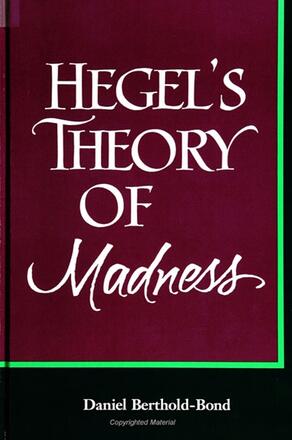Contents
Acknowledgments
Abbreviations
Note on the Zusätze to Hegel's Lectures
Chapter One. Introduction
Chapter Two. Hegel's Place in Early Nineteenth Century Views of Madness
Hegel's Middle Path
The Turning Point
Contesting Factions
Romantic and Empirical Medicine
The Somatic and Psychic Schools
Hegel's Speculative Philosophy of Medicine
Hegel's Anthropology of Madness:
The Reversion of the Mind to Nature
Regression, Displacement, Dream
Hegel and the Romantics
Hegel, the Somatic/Psychic Controversy, and Animal Magnetism
Chapter Three. Madness as the Decentering of Reason
The Anatomy of Madness
Withdrawal, Separation, and Decentering
Feeling and Language
Nature, Dream, and the Unconscious
Madness and the Developed Consciousness
Desire
Despair
Are We All Mad?
Madness in Relation to Stoicism, Skepticism, and the Unhappy Consciousness
The Intimacy of Madness: Christiane, Hölderlin, and the Limits of an Ontology of Madness
Madness and Hegel's Idealism
The Quest for Unity in the Midst of Discord
Idealism, Madness, and History
Chapter Four. Madness and the Second Face of Desire
The Two Faces of Desire
'I am I,' Narcissism, and the Death Instinct
Consciousness and Self-Consciousness
The Lure of a Primordial Unity
The Death Instinct and the Work of Destruction
The Role of Destruction in Despair and Madness
The Other Face of Desire: the Power of Evolution
The Fall
Eden: Nature, Innocence, and Evil
The Serpent and the Curse
Forgetfulness
Labor
Chapter Five. Madness and the Unconscious
Placing Hegel in Dialogue with Nietzsche and Freud
The Definition of Madness: Regression, Separation, Nostalgia
Hegel and Freud
Features of the Unconscious
Health and Illness
Enter Nietzsche
Illness and 'The Great Health'
The Critique of Metaphysical Constructions of Reality
Madness, Dreams, and Sublimation
Dreams and Art
Art, Sublimation, and Repression
The Status of Privacy and Community
The Double Center of Madness
Chapter Six. Madness, Action, and Intentionality
The Idea of Un-Intentionality
The Anatomy of Unintentionality
The Circle of Action
Hegel's Critique of Anti-Consequentialism
The Recoil of Action and Alienation
Intentionality and Language
The Unintentional and the Unconscious
Madness and Unintentionality
Chapter Seven. Madness and Tragedy
On the Borderline: The Between-Space of Madness and 'Normalcy'
The Ontology of Disunion
The Broken World
Madness and The Tragic Collision of Opposites
Madness, Tragedy, and Despair
Submersion, Darkness, and the Infernal Powers of Nature
The Return to Origins, a Place Prior to Time
Physis and Nomos
Ajax and Antigone
Issues of Patriarchy
Myth and History
Inversion, Ambiguity, and Guilt
The Inverted World
The Law of the Heart and Tragic Inversion
The Unconscious
Evil and Guilt
Ontology and Anguish: The Logic and Horror of Evil
Darkened Mirrors
Chapter Eight. Madness and Society: Coming to Terms with Hegel's Silence
The Absent Stage Setting
Foucault and Szasz:
The Social-Political 'Invention' of Madness
Some Differences and Similarities
The Semantics of Madness
The Politics of Semantic Transformation
Habeas Corpus: You Should Have the Body
Decoding Hegel's Silence
The Context of the ''Anthropology" of Madness
The Life of the Soul as Pre-History
From Anthropology to Phenomenology: From Origins to History
Hegel's Ontology of Madness as an 'Abbreviation'?
Satisfying the Writ of Habeas Corpus: We Have the Body
Therapeutics: Coercion or Liberation?
Hegel's Pinelian Heritage: 'Moral Treatment' and the Imperative of Labor
The Missing Link: Poverty, Destitution, Social Marginalization
A Revolutionary Therapeutics?
Extending Hegel's 'Middle Path': Reconciling the Social Constitution of Madness with Ontology
Notes
Bibliography
Author Index
Subject Index
